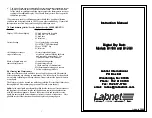
3 Product and Functional Description | 3.2 Main Components
ZEISS
3.2.3 Electron Optical Column | Gemini 1
Purpose
The Gemini 1 column is the part of the microscope, where electrons are emitted, accelerated, de-
flected, focused, and scanned. Main characteristics of the Gemini optics are the beam booster
and an objective lens that consists of a combined electrostatic/electromagnetic lens doublet.
U
Sup
U
Ext
U
EHT
U
B
1
2
4
9
7
3
5
8
6
Fig. 14: Schematics of the electron optics
1
Gun
Generates the electron beam.
2
Extractor
Positive electrode that extracts elec-
trons from the filament.
3
Anode aperture
4
Condenser
Collects and focuses the electron beam
onto the specimen.
5
Multihole aperture
6
Upper detector: EsB detector or InLens
SE Singlet detector
Lower detector: InLens SE detector
7
Objective lens
Focuses the electron beam on to the
specimen surface.
8
Scanning coils
Deflect the beam across the specimen
surface in what is usually referred to as
a raster scan.
9
Specimen
Sup
Suppressor voltage
Ext
Extractor voltage
Acceleration voltage
B
Liner tube voltage
Gun
A Schottky field emitter serves as gun
1
. The filament is heated by applying the filament cur-
rent. Electrons are emitted from the heated filament while an electrical field, called extractor volt-
age (U
Ext
), is applied. To suppress unwanted thermionic emission from the shank of the Schottky
field emitter, a suppressor voltage (U
) is applied as well.
EHT
The emitted electrons are accelerated by the acceleration voltage (U
EHT
). The beam booster (U
B
,
booster voltage), which is always at a high potential if the acceleration voltage is 20 kV or less, is
integrated directly after the anode. This guarantees that the energy of the electrons in the entire
beam path is always much higher than the set acceleration voltage. This considerably reduces the
sensitivity of the electron beam to magnetic stray fields and minimizes the beam broadening.
34
Instruction Manual ZEISS GeminiSEM series | en-US | Rev. 2 | 349500-8138-000
















































